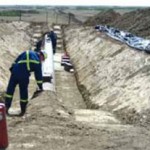
Shipping oil east only counts as oil security if the oil stays in Canada — and it doesn't.
by Gordon Laxer
For years I was a voice in the wilderness calling for an oil pipeline to bring western oil to Eastern Canada. Now that TransCanada and Enbridge each have plans to build one, I should be pleased. But I'm not.
Canada is in the absurd position of promising the US oil security through the export of oil from Alberta — while Canada itself is the most oil insecure country in the global North.
While Canada exports two-thirds of its oil — 99 percent of that to the US — Quebec and Atlantic Canada rely overwhelmingly on oil imports, half of that from the volatile Middle East. Unlike all other member countries in the International Energy Agency, Canada has no strategic petroleum reserves to use when the next international oil supply crisis strikes.
Shipping oil from Alberta 4,400 kilometres to the Atlantic is a big project, but big oil is desperate to get oil to tidewater — any tidewater — where oil prices are much higher.
Why, then, am I skeptical about TransCanada's proposal to partially convert its natural gas main line to an oil pipeline to Quebec and perhaps New Brunswick, and about Enbridge's plan to reverse its Montreal to Sarnia pipeline to once again bring western oil to Quebec?
Because right now the project is all about exports and corporate profits and it has nothing to do with energy or environmental security for eastern Canadians. Big, mainly foreign, oil and the big pipeline corporations seized on sending Alberta oil east, after they were blocked from shipping oilsands oil south through the planned TransCanada's Keystone XL line to Texas and west via the proposed Northern Gateway pipeline to the BC coast. Shipping oil from Alberta 4,400 kilometres to the Atlantic is a big project, but big oil is desperate to get oil to tidewater — any tidewater — where oil prices are much higher.
But whatever the motivation for building them, won't the west-to-east oil pipelines make eastern Canadians more energy secure? Not necessarily. That incidental benefit could quickly be dropped if and when big oil decides that exports are more lucrative than supplying Canadians with their own oil.
The Harper government has made it clear that it will not intervene to provide Canadians with energy security the way all other countries in the International Energy Agency do. "We don't tell the companies to put the pipelines here or there," Harper declared last year.
Instead of supplying domestic, conventional oil to eastern Canadians as part of a national eco-energy plan to transition Canada off fossil fuel, this is just another oilsands exporting ploy. If it succeeds, it will sink Alberta and Canada even deeper into a hewers-of-wood trap that is also a carbon trap.
Do we want to be an innovation-based economy or a resource-based economy? Unfortunately, we can't be both, notes Daniel Trefler, a business professor at the University of Toronto.
“The creation of an affordable, environmentally friendly alternative to oil would be a great thing for the world. It could be economically devastating for Alberta if, when it happens, we are still heavily dependent on oil exports.”
The only saving grace of the proposed west-to-east lines is that the six refineries east of the Quebec-Ontario border have limited capacity to handle Alberta's heavier oil. At first, at least, most of the oil on the lines would be lighter, less environmentally-damaging crude oil. However there is no guarantee that will last.
We shouldn't expect environmentalists in the US, Norway or elsewhere to do all the heavy lifting in getting Alberta and Canada to cap and then phase out dirty oilsands oil. Canadians in every province should demand that their provincial governments say "no pasaran." "We will not allow oilsands oil to pass through our province."
Former trade minister David Emerson warned about the danger of Alberta failing to diversify its economy. His 2011 report for the Alberta Premier's Council for Economic Strategy said: "the creation of an affordable, environmentally friendly alternative to oil would be a great thing for the world. It could be economically devastating for Alberta if, when it happens, we are still heavily dependent on oil exports."
Unfortunately, the Alberta and Canadian governments have no plans to avoid that trap. Instead they deliberately mix up the interests of big, mainly foreign, oil corporations with those of Albertans and Canadians. But it is not in Albertans' interests to get stuck in a fossil fuel belt that will soon be seen as much of a dead end as the auto rust belt of Michigan and southwestern Ontario.
This article previously appeared in the Edmonton Journal.
© Copyright 2013 Gordon Laxer, All rights Reserved. Written For: StraightGoods.ca
 Gordon Laxer is a political economy professor and the founding director and former head of Parkland Institute at the University of Alberta.
Gordon Laxer is a political economy professor and the founding director and former head of Parkland Institute at the University of Alberta.
Sorry, the comment form is closed at this time.